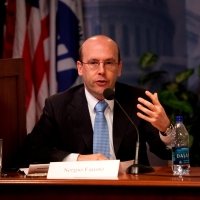
A blog of the Brazil Institute
Since the first quarter of 2014, Brazil has been living in “crisis mode.” September 2016 marked seven consecutive quarters of negative economic growth that resulted in a cumulative negative variation in the GDP of more than 7 percent, the greatest recession ever registered in the country. In the same period, investigations conducted by public attorneys and Brazil’s federal police uncovered the largest corruption scheme in Brazilian history. The scandal was rooted in the largest state-owned company in the country, Petrobras, but had widespread ramifications. By the end of December 2016, nearly 200 people had been indicted or imprisoned. Most were businessmen and politicians, including the former president of Brazil, Luiz Inácio Lula da Silva, who was a defendant in five judicial inquiries. At the confluence of the economic and political crises, President Dilma Rousseff, a member of the Partido dos Trabalhadores (PT) and reelected in October 2014 to a four-year term, was removed from office in April 2016 and permanently impeached the following September. She was replaced by Vice President Michel Temer, who is affiliated with the Partido do Movimento Democrático do Brasil (PMDB).
The economic crisis and the corruption probe (called Operação Lava Jato, or Operation Car Wash) destroyed the power system that had been expanding throughout the PT administrations from 2003 to 2016. This system was composed of an ideologically heterogeneous alliance of parties under the PT’s hegemony; trade unions; state-owned companies’ pension funds, which were controlled by unionists affiliated with the PT; and a relatively restricted but powerful group of companies that were the primary beneficiaries of federal government-subsidized credit and contracts. With resources diverted from state-owned companies, these private companies provided electoral funding for the dominant political coalition (the opposition also received funding, but on a smaller scale). Intellectually speaking, it is an interesting case of an attempt to develop state capitalism in a competitive political environment. The lesson to be learned is that this kind of experiment ends up undermining democracy by giving the incumbents an extraordinary electoral advantage and compromising the system of checks and balances, and/ or generating fiscal disarray and financial crisis. In the case of Brazil, the experiment was interrupted before democracy mutated into a semi-democratic regime. That it fell short of causing a mutation in the nature of the political structure can be explained to a great extent by the strength of some institutions: the independence of the judicial branch, the autonomy of public attorneys, and the freedom of the press, all of which are guaranteed by the Brazilian Constitution and upheld by society.
The destruction of the party’s system that was dominant between 2003 and 2015 turned into a crisis of the entire political system, as the opposition parties also became involved in the criminal investigations carried out by the Lava Jato operation. This picture is similar to the one that prevailed in Italy in the wake of the Mani Pulite investigation in the mid- 1990s. Conducted by public attorneys, this investigation revealed the existence of widespread and systematic corruption schemes involving businesses and political parties. As a consequence, the Italian political party system that had developed since the end of World War II collapsed. In Brazil, however, the political crisis came in conjunction with a deep economic crisis.
In the short span of this issue brief, I analyze both the anatomy of these mutually reinforcing crises and the challenges that Brazil faces in overcoming them.
To read the full issue brief, click here.
Author


Brazil Institute
The Brazil Institute—the only country-specific policy institution focused on Brazil in Washington—aims to deepen understanding of Brazil’s complex landscape and strengthen relations between Brazilian and US institutions across all sectors. Read more

Explore More in Brazil Builds
Browse Brazil Builds
They're Still Here: Brazil's unfinished reckoning with military impunity



